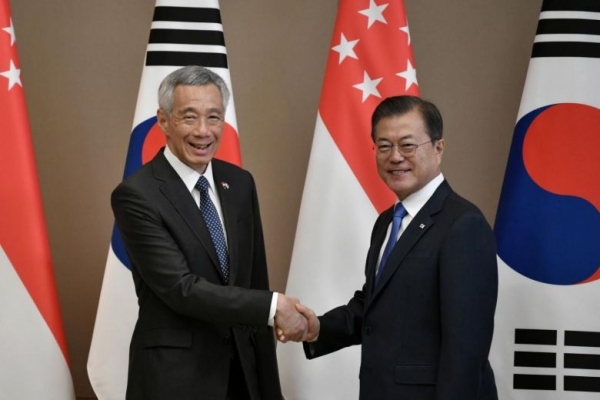
Prime Minister Lee Hsien Loong (left) shakes hands with South Korean President Moon Jae-in during their meeting at the presidential Blue House in Seoul on Nov 23, 2019.
SEOUL – Singaporeans can look forward to more flights to South Korea, thanks to an expanded air services agreement formalised on Saturday (Nov 23).
Under the pact which comes into effect on Tuesday (Nov 26), Singapore and South Korean carriers can operate any number of passenger and cargo flights between any destinations in both countries.
They can also better connect their services through third countries, and connect their services beyond South Korea and Singapore to third countries.
The announcement was made in conjunction with a meeting on Saturday (Nov 23) between South Korean President Moon Jae-in and Prime Minister Lee Hsien Loong at the presidential Blue House, where both leaders welcomed the growing cooperation between South Korea and Singapore.
Underscoring the multifaceted nature of bilateral ties, the two leaders witnessed the signing and exchange of cooperation pacts in standards and conformance, manufacturing of pharmaceuticals, smart cities and cybersecurity cooperation.
The expansion of the air services agreement is expected to improve connectivity and boost bilateral tourism and trade. It also opens up the possibility for carriers on both sides to mount more and new services between Singapore and any points in South Korea.
Currently, Singapore Airlines (SIA) operates 28 weekly services to Seoul and flies to Busan four times a week. Scoot operates three weekly services from Singapore through Taipei to Seoul.
Korean Air and Asiana Airlines run 28 weekly passenger services and seven weekly cargo services between Singapore and Seoul, while Jeju Air runs four weekly services from Busan to Singapore.
First Korean Start-up Centre in South-east Asia to be set up in Singapore
Also announced was the establishment of the first South-east Asia Korea Start-up Centre in Singapore in 2020, by South Korea’s Ministry of SMEs and Start-ups, with the support of Enterprise Singapore (ESG).
The centre will provide South Korean small and medium-sized enterprises (SMEs) and start-ups with the infrastructure and network to set up in, and plug into, Singapore’s start-up and innovation ecosystem.
It will be a full-fledged facility offering networking events, physical work spaces as well as services on setting up a business.
The centre will add to the vibrant start-up ecosystem in Singapore, and give local companies closer access to the dynamic innovation and technology scene in South Korea which has more than 440,000 technology start-ups, said ESG in a press statement.
The South Korean government will set up another centre in Stockholm, Sweden in 2020.
ESG and the Korean Agency for Technology and Standards also inked a memorandum of understanding (MOU) on Saturday (Nov 23) on standards and conformance. It aims to promote knowledge exchanges, focusing on key areas in smart cities and smart manufacturing.
ESG’s Assistant Chief Executive Officer Mr Tan Soon Kim said, of the new centre and MOU: “Such cooperation will pave the way for more business and technology partnerships between Singapore and South Korea enterprises as they grow and scale their businesses globally.”
Director-General of the Korean Ministry of SMEs and Start-ups, Mr Rho Yong Seok, said: “Singapore is one of our most important partners, which also could be a gateway for South Korea SMEs and start-ups to advance into the Asean market.”
The raft of agreements on Saturday follows President Moon’s state visit to Singapore in July last year, where six pacts were exchanged in areas such as small and medium-sized enterprises and start-ups, research and development, and the environment.
Total trade with South Korea amounted to $40.3 billion in 2018, making it Singapore’s 9th largest trading partner. It is the Republic’s 6th largest source of investments in Asia, with a cumulative direct investment of $20.8 billion.
According to South Korea’s Ministry of Trade, Industry and Energy, Singapore was the 6th largest investor in South Korea in 2018 with foreign direct investment of US$1.48 billion.
